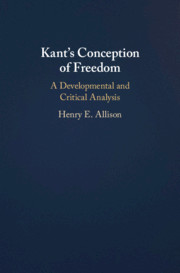Book contents
- Kant’s Conception of Freedom
- Kant’s Conception of Freedom
- Copyright page
- Dedication
- Contents
- Preface
- Acknowledgments
- Note on Sources and Key to Abbreviations and Translations
- 1 Kant’s Writings of the 1750s and the Place in Them of the Free Will Issue
- 2 Kant’s Theoretical Philosophy in the Early 1760s and Its Relation to His Conception of Freedom
- 3 Kant’s Moral Philosophy in the Early 1760s
- 4 Kant’s Dialogue with Rousseau Supplemented by His Dreams of a Spirit-Seer
- 5 From the “Great Light” to the “Silent Decade”: Kant’s Thoughts on Free Will 1769–1780
- 6 Kant’s Account of Free Will in the Critique of Pure Reason
- 7 From the Critique of Pure Reason to the Groundwork
- 8 The Fact of Reason and Freedom in the Critique of Practical Reason
- 9 The Critique of the Power of Judgment and the Transition from Nature to Freedom
- 10 Kant’s Final Thoughts on Free Will
- Bibliography
- Index
4 - Kant’s Dialogue with Rousseau Supplemented by His Dreams of a Spirit-Seer
Published online by Cambridge University Press: 19 December 2019
- Kant’s Conception of Freedom
- Kant’s Conception of Freedom
- Copyright page
- Dedication
- Contents
- Preface
- Acknowledgments
- Note on Sources and Key to Abbreviations and Translations
- 1 Kant’s Writings of the 1750s and the Place in Them of the Free Will Issue
- 2 Kant’s Theoretical Philosophy in the Early 1760s and Its Relation to His Conception of Freedom
- 3 Kant’s Moral Philosophy in the Early 1760s
- 4 Kant’s Dialogue with Rousseau Supplemented by His Dreams of a Spirit-Seer
- 5 From the “Great Light” to the “Silent Decade”: Kant’s Thoughts on Free Will 1769–1780
- 6 Kant’s Account of Free Will in the Critique of Pure Reason
- 7 From the Critique of Pure Reason to the Groundwork
- 8 The Fact of Reason and Freedom in the Critique of Practical Reason
- 9 The Critique of the Power of Judgment and the Transition from Nature to Freedom
- 10 Kant’s Final Thoughts on Free Will
- Bibliography
- Index
Summary
According to Josef Schmucker, the collection of jottings that has become known as Remarks in the Observations on the Feeling of the Beautiful and Sublime because of their location rather than their content constitutes a virtual dialogue with Rousseau, which Schmucker also described as beginning a second stage in the development of Kant’s ethical thought.1 Although this is not the only source for Kant’s views regarding Rousseau in the mid-1760s, since there were significant discussions of the latter’s views in both his Announcement and Herder’s transcript of his ethics lectures, it is indisputably the most important. Kant discusses a large number of topics in Remarks, not all of which involve Rousseau.2 Its central concern, however, is with the relation between humanity in its natural and social conditions and moral theory, broadly construed, which is to say moral anthropology, the importance of which Kant had affirmed in his near contemporaneous and previously discussed Announcement. But while it will be necessary to consider what additional light Remarks sheds, by way of Rousseau, on this broad topic, our main focus will be on its contribution to the understanding of Kant’s views on free will at the time and the influence of Rousseau on these views.
- Type
- Chapter
- Information
- Kant's Conception of FreedomA Developmental and Critical Analysis, pp. 125 - 175Publisher: Cambridge University PressPrint publication year: 2020



